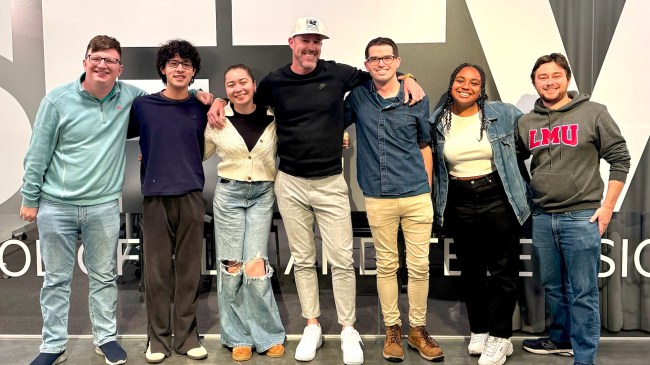Hollywood’s Top Film Schools Now Teach AI: ‘Teaching Is Not Endorsing’

Film school is not cheap. A year of graduate-level classes at USC’s School of Cinematic Arts can run upward of $40,000. So why, you might ask, would you spend that much money learning to use generative AI tools when you can do that at home?
That’s the question film schools across the country grapple with this summer as they head into the fall semester. Academia has quietly discussed artificial intelligence for some years now: What it means, how it will affect the artform and the business of Hollywood, and the best way to teach it.
As the discourse grows louder and the tech gets better, students are already becoming pros. At this point, AI is something film schools must address.
“They have to,” said Tim Kashani, a producer and professor at Chapman University’s Dodge Film School. “I agree this has the potential to do more damage than good, but my philosophy is that’s why I want all the artists and educators and entertainers to be using it now so we don’t leave the decisions in the hands of just the technologists.”
At Loyola Marymount University, the coming fall semester will introduce a new class at its School of Film and Television: “Producing and Screenwriting with AI.” At Dodge this spring, Kashani taught an “experimental” course around AI; it will return in spring 2025. Meanwhile, USC is investing $10 million in an AI institute that brings together the film school, journalism, and other disciplines.
AI remains polarizing, but teachers play a key role in this moment: They are in a position to lay ground rules for the next generation of filmmakers.
“Just because we’re teaching it, it doesn’t mean we’re endorsing it,” said Holly Willis, a professor in USC’s Media + Practices division of its film school. She is also the head of its Center for Generative AI and Society.
“We want to create the thought leaders that will help shape the practices and the laws moving forward,” she told IndieWire. “What makes a database? What makes a model? Where do these images come from? Who gave permission for these images to be captured and shared? An ethics around all of this is also really important, and as a film school, it’s our job to teach the next generation how to navigate this world ethically.”
If you’re horrified by the idea that database analysis is part of a curriculum traditionally driven by storytelling principles, you aren’t alone. Justin Trevor Winters, a screenwriter and principal of Verified Labs, is also the instructor of LMU’s upcoming AI course. He said students tell him some professors ban AI in the classroom altogether. However, after leading LMU’s AI task force for the last 18 months, he has the faculty’s support.
“Is this a piece of technology that is going to allow students to cheat or to plagiarize? Is it going to take them away from the craft of creativity?” Winters said. “In the beginning, we didn’t have any answers, we needed to see how students were going to engage with the technology.”

While AI is wending its way into film schools, it’s not (yet) part of official curriculums or a requirement for graduation. At Chapman, Kashani’s course “AI: Pioneering the Future of Entertainment” isn’t even a formal elective; it was offered to 17 students as an “experimental” course with an evolving syllabus. Some didn’t know what an LLM was coming in; others knew about the latest tech before the faculty.
Kashani said all students left with new agency around AI literacy, which was “very relevant” to employers.
“The class removed the fear aspect that they weren’t worthy to talk about it,” Kashani said. “They felt confident in the fact that I was very transparent to say, ‘Anybody who tells you that they’re an expert and can tell you what’s happening in this three to five years from now, run away from [them] because we’re all figuring this out as we go.’”
In the Chapman course, each week centered on how AI can impact a different part of the filmmaking workflow, from development through post. For the upcoming LMU course, each week will be built around experimenting with a different AI tool; students will develop, write, produce, and even release a short film that uses the tech in some form.
For instance, Winters will tell students to arrive at an idea completely independent of technology and then use AI to help the idea evolve. When teaching ChatGPT, students will use AI to distill their idea to a single sentence. Subsequent courses on Midjourney will have them storyboard their ideas and get a sense for how it can best be shot. A crash course on Suno will teach them to generate a score. Students will have free access to the tech through a partnership with each of the companies.
“The whole goal of the class is to encourage students to use the technology they have at their fingerprints to create the best product possible,” Winters said. “It doesn’t mean it has to be entirely created from tech or AI. It just needs to be an aspect of it, so they’re engaging with the technology to be better storytellers.”
Willis’ course focused on the history behind AI, how it works, and was designed as a working lab for every tool they could get their hands on. The course attracted everyone from screenwriters to production students to game designers. USC also offered a directing course in which students got more technical, such as learning how to move actors through the virtual space using a prompt.
That course, “Contemporary Directing Practice,” did not celebrate or advertise AI. In fact, it was “kept on the down low,” she said, in part because it was taught during the strikes when any discussion of AI could easily be met with “outright hostility.”
“Emotions were very high. It was very difficult to even talk about this,” Willis said. “Those students were very wary about AI. They didn’t come in saying, ‘Oh, I’m so excited.’ They were very wary and upset and also reticent to tell their friends and colleagues that they were in the class because there was so much animosity towards AI.”

Screenwriting professors were especially hesitant. Willis said those teachers wanted to nurture the nascent talents and voices within each student, and initially defaulting to a chatbot could disrupt that.
Willis now says the overall attitude has shifted to one of confidence and respect. “You still need to understand visual design, mise-en-scéne, editing, timing, pacing. These are not things that AI can give you,” she said. “You have to have that kind of awareness and knowledge that comes from watching and studying films very carefully.”
Ed Collins, a Chapman professor of an advertising course dedicated to AI storytelling, says academia’s sweet spot is finding ways to teach AI skills without replacing the fundamentals.
“You can shortcut things so much that you rely on the technology instead of going through the process yourself,” Collins said. “When you need to write a script, you need to write it, you need to have your professor comment on it, edit it, change it, modify it, and send you back to the drawing board. That’s how we learn.”
But Collins tells his students whatever they do, “don’t be naive” about AI.
“That’s the worst option,” he said. “Because you’re getting get run over by the train.”




